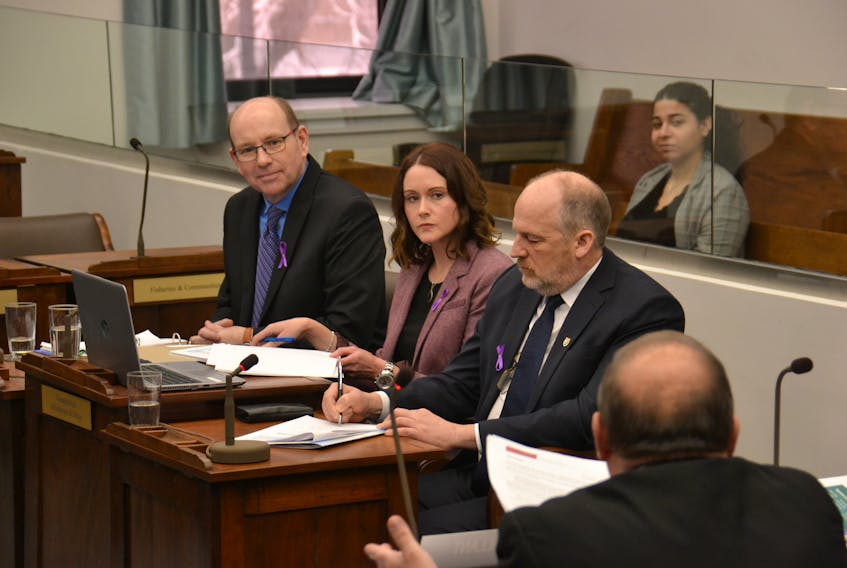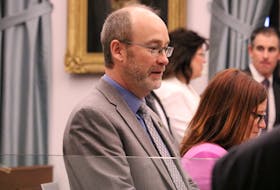A top civil servant from the department responsible for social assistance programs declined to offer an opinion on the subject of a basic income guarantee on Wednesday.
David Keedwell, deputy minister of social development and housing, took questions from MLAs on Wednesday during a meeting of the standing committee on poverty. He and two other top staff members from the department attended the meeting to speak about P.E.I.’s social assistance program.
The committee has a mandate to prepare recommendations related to a basic income guarantee pilot as well as a provincial measure of poverty. Social Development and Housing Minister Ernie Hudson is a member of this standing committee.
A basic income guarantee, which has recently been popularized by former U.S. Democratic presidential candidate Andrew Yang, is an anti-poverty program that would provide all individuals, regardless of their ability to work, with a cash payment.
Keedwell was asked by Liberal MLA Gord McNeilly about how a basic income program would affect social assistance or other programs funded by social development and housing.
“We don’t want to see any programs get deterred in the end,” McNeilly said.
“Have you researched other basic income guarantees that have been around and what are your thoughts about moving forward with regard to programming?”
“I think from our department, ourselves, we're not looking at a basic income guarantee, we're monitoring the social assistance program," Keedwell replied.
Keedwell said he believed the aims of social assistance would be different from that of a universal income program.
"One is a financial universal income and the other is a working program (aimed at) entering people back into society."
Other experts who have spoken before the committee have suggested that a basic income pilot program could replace social assistance for participants.
In late December, the province announced increases to social assistance rates, totalling $109 per month for single adults. In a rarity, the move was praised by Green Opposition MLA Hannah Bell in a government press release.
Social assistance food rates also rose by 10 per cent in January 2019, while shelter rates rose almost 10 per cent in 2018.
But during Wednesday’s meeting, Green MLA Hannah Bell raised the gap between the Market Basket Measurement (MBM), a poverty measurement currently used by the federal government, and current social assistance rates in P.E.I.
Under the MBM, Bell said a single individual in Charlottetown would have to earn $19,000 per year to rise above the poverty line. But Bell said single individuals usually earn around $13,000 per year on social assistance.
"I appreciate that you provide things like life skills and budgeting, but I have no idea how you teach somebody to budget with $1,000 a month," Bell said.
Karen McCaffrey, director of social programs, said P.E.I. does not currently use the MBM as a poverty measurement.
"Comparatively we have the second highest rate [of assistance] in the country for single individuals,” McCaffrey said.
“It's still a gap."
McCaffrey said if the committee recommended the province adopt the MBM as its poverty threshold, the department would evaluate this.
McCaffrey noted that, of the 3,400 individuals on social assistance in P.E.I., 2,400 are single individuals.
An exchange during the meeting later evolved into a brief spat on Twitter, after McNeilly asked the three civil servants about consultations they had with the Green opposition before December’s increase of social assistance rates.
I am shocked & disappointed my colleague on @peileg cmtee @GordMcNeillyPEI feels recent significant increase in social assistance food rates was not good idea, esp with his focus on wellness. Food insecurity is major barrier to wellness for Islanders #securityanddignity #peipoli
— Hannah Bell 🇨🇦💚 (@hannahbethbell) February 12, 2020
“I was not consulted. I found out about this in a press release,” McNeilly said.
McNeilly then asked what methods would be used to measure the effectiveness of the rate changes.
Seemingly in response, Bell fired off a Twitter message saying she was “shocked and disappointed” about McNeilly’s comments, and suggested he felt that increasing “social assistance food rates was not a good idea.”
In response, McNeilly accused Bell of mischaracterization.
“Today, [Hannah Bell] misled people about my strong position supporting food security for Islanders. With the record cleared, I don't expect an apology,” McNeilly said in his own tweet.









